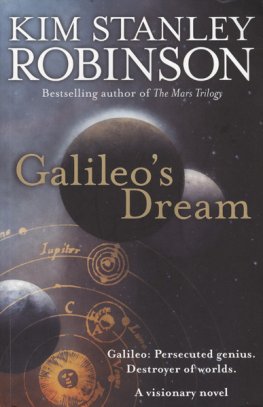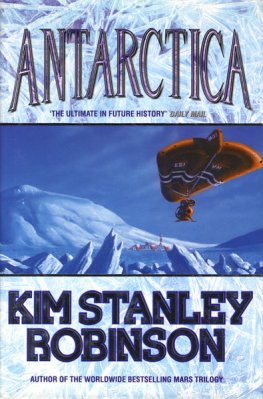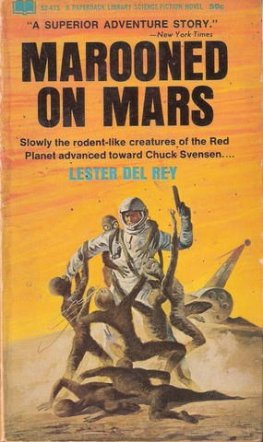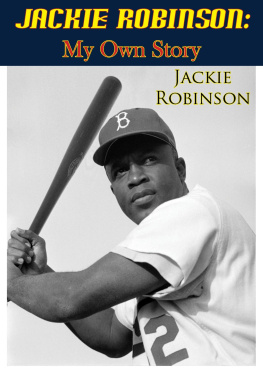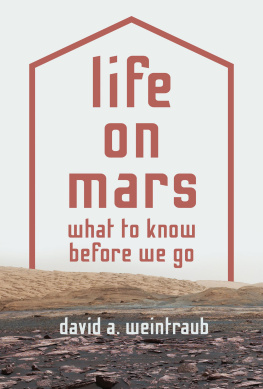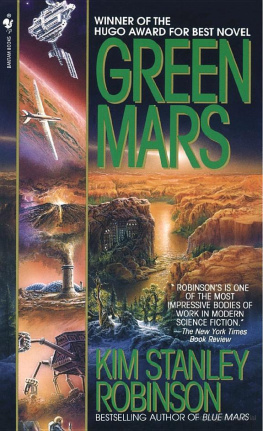Kim Robinson - Red Mars
Here you can read online Kim Robinson - Red Mars full text of the book (entire story) in english for free. Download pdf and epub, get meaning, cover and reviews about this ebook. year: 1993, publisher: Bantam Books, genre: Science fiction. Description of the work, (preface) as well as reviews are available. Best literature library LitArk.com created for fans of good reading and offers a wide selection of genres:
Romance novel
Science fiction
Adventure
Detective
Science
History
Home and family
Prose
Art
Politics
Computer
Non-fiction
Religion
Business
Children
Humor
Choose a favorite category and find really read worthwhile books. Enjoy immersion in the world of imagination, feel the emotions of the characters or learn something new for yourself, make an fascinating discovery.
- Book:Red Mars
- Author:
- Publisher:Bantam Books
- Genre:
- Year:1993
- ISBN:0-553-09204-9
- Rating:4 / 5
- Favourites:Add to favourites
- Your mark:
- 80
- 1
- 2
- 3
- 4
- 5
Red Mars: summary, description and annotation
We offer to read an annotation, description, summary or preface (depends on what the author of the book "Red Mars" wrote himself). If you haven't found the necessary information about the book — write in the comments, we will try to find it.
Red Mars — read online for free the complete book (whole text) full work
Below is the text of the book, divided by pages. System saving the place of the last page read, allows you to conveniently read the book "Red Mars" online for free, without having to search again every time where you left off. Put a bookmark, and you can go to the page where you finished reading at any time.
Font size:
Interval:
Bookmark:
Red Mars
by Kim Stanley Robinson
Part One
Festival Night
Mars was empty before we came. Thats not to say that nothing had ever happened. The planet had accreted, melted, roiled and cooled, leaving a surface scarred by enormous geological features: craters, canyons, volcanoes. But all of that happened in mineral unconsciousness, and unobserved. There were no witnesses except for us, looking from the planet next door, and that only in the last moment of its long history. We are all the consciousness that Mars has ever had.
Now everybody knows the history of Mars in the human mind: how for all the generations of prehistory it was one of the chief lights in the sky, because of its redness and fluctuating intensity, and the way it stalled in its wandering course through the stars, and sometimes even reversed direction. It seemed to be saying something with all that. So perhaps it is not surprising that all the oldest names for Mars have a peculiar weight on the tongue Nirgal, Mangala, Auqakuh, Harmakhis they sound as if they were even older than the ancient languages we find them in, as if they were fossil words from the Ice Age or before. Yes, for thousands of years Mars was a sacred power in human affairs; and its color made it a dangerous power, representing blood, anger, war and the heart.
Then the first telescopes gave us a closer look, and we saw the little orange disk, with its white poles and dark patches spreading and shrinking as the long seasons passed. No improvement in the technology of the telescope ever gave us much more than that; but the best Earthbound images gave Lowell enough blurs to inspire a story, the story we all know, of a dying world and a heroic people, desperately building canals to hold off the final deadly encroachment of the desert.
It was a great story. But then Mariner and Viking sent back their photos, and everything changed. Our knowledge of Mars expanded by magnitudes, we literally knew millions of times more about this planet than we had before. And there before us flew a new world, a world unsuspected.
It seemed, however, to be a world without life. People searched for signs of past or present Martian life, anything from microbes to the doomed canal-builders, or even alien visitors. As you know, no evidence for any of these has ever been found. And so stories have naturally blossomed to fill the gap, just as in Lowells time, or in Homers, or in the caves or on the savannah stories of microfossils wrecked by our bio-organisms, of ruins found in dust storms and then lost forever, of Big Man and all his adventures, of the elusive little red people, always glimpsed out of the corner of the eye. And all of these tales are told in an attempt to give Mars life, or to bring it to life. Because we are still those animals who survived the Ice Age, and looked up at the night sky in wonder, and told stories. And Mars has never ceased to be what it was to us from our very beginning a great sign, a great symbol, a great power.
And so we came here. It had been a power; now it became a place.
* * *And so we came here. But what they didnt realize was that by the time we got to Mars, we would be so changed by the voyage out that nothing we had been told to do mattered anymore. It wasnt like submarining or settling the Wild West it was an entirely new experience, and as the flight of the Are s went on, the Earth finally became so distant that it was nothing but a blue star among all the others, its voices so delayed that they seemed to come from a previous century. We were on our own; and so we became fundamentally different beings.
All lies, Frank Chalmers thought irritably. He was sitting in a row of dignitaries, watching his old friend John Boone give the usual Boone Inspirational Address. It made Chalmers weary. The truth was, the trip to Mars had been the functional equivalent of a long train ride. Not only had they not become fundamentally different beings, they had actually become more like themselves than ever, stripped of habits until they were left with nothing but the naked raw material of their selves. But John stood up there waving a forefinger at the crowd, saying We came here to make something new, and when we arrived our earthly differences fell away, irrelevant in this new world! Yes, he meant it all literally. His vision of Mars was a lens that distorted everything he saw, a kind of religion.
Chalmers stopped listening and let his gaze wander over the new city. They were going to call it Nicosia. It was the first town of any size to be built free-standing on the martian surface; all the buildings were set inside what was in effect an immense clear tent, supported by a nearly invisible frame, and placed on the rise of Tharsis, west of Noctis Labyrinthus. This location gave it a tremendous view, with a distant western horizon punctuated by the broad peak of Pavonis Mons. For the Mars veterans in the crowd it was giddy stuff: they were on the surface, they were out of the trenches and mesas and craters, they could see forever! Hurrah!
A laugh from the audience drew Franks attention back to his old friend. John Boone had a slightly hoarse voice, and a friendly Midwestern accent, and he was by turns (and somehow even all at once) relaxed, intense, sincere, self-mocking, modest, confident, serious, and funny. In short, the perfect public speaker. And the audience was rapt; this was the First Man On Mars speaking to them, and judging by the looks on their faces they might as well have been watching Jesus produce their evening meal out of the loaves and fishes. And in fact John almost deserved their adoration, for performing a similar miracle on another plane, transforming their tin can existence into an astounding spiritual voyage. On Mars we will come to care for each other more than ever before, John said, which really meant, Chalmers thought, an alarming incidence of the kind of behavior seen in rat overpopulation experiments; Mars is a sublime, exotic and dangerous place, said John meaning a frozen ball of oxidized rock on which they were exposed to about fifteen rem a year; And with our work, John continued, we are carving out a new social order and the next step in the human story i.e. the latest variant in primate dominance dynamics.
John finished with this flourish, and there was, of course, a huge roar of applause. Maya Toitovna then went to the podium to introduce Chalmers. Frank gave her a private look which meant he was in no mood for any of her jokes; she saw it and said, Our next speaker has been the fuel in our little rocket ship, which somehow got a laugh. His vision and energy are what got us to Mars in the first place, so save any complaints you may have for our next speaker, my old friend Frank Chalmers.
At the podium he found himself surprised by how big the town appeared. It covered a long triangle, and they were gathered at its highest point, a park occupying the western apex. Seven paths rayed down through the park to become wide, tree-lined, grassy boulevards. Between the boulevards stood low trapezoidal buildings, each faced with polished stone of a different color. The size and architecture of the buildings gave things a faintly Parisian look, Paris as seen by a drunk Fauvist in spring, sidewalk cafes and all. Four or five kilometers downslope the end of the city was marked by three slender skyscrapers, beyond which lay the low greenery of the farm. The skyscrapers were part of the tent framework, which overhead was an arched network of sky-colored lines. The tent fabric itself was invisible, and so taken all in all, it appeared that they stood in the open air. That was gold. Nicosia was going to be a popular city.
Chalmers said as much to the audience, and enthusiastically they agreed. Apparently he had the crowd, fickle souls that they were, about as securely as John. Chalmers was bulky and dark, and he knew he presented quite a contrast to Johns blond good looks; but he knew as well that he had his own rough charisma, and as he warmed up he drew on it, falling into a selection of his own stock phrases.
Font size:
Interval:
Bookmark:
Similar books «Red Mars»
Look at similar books to Red Mars. We have selected literature similar in name and meaning in the hope of providing readers with more options to find new, interesting, not yet read works.
Discussion, reviews of the book Red Mars and just readers' own opinions. Leave your comments, write what you think about the work, its meaning or the main characters. Specify what exactly you liked and what you didn't like, and why you think so.






